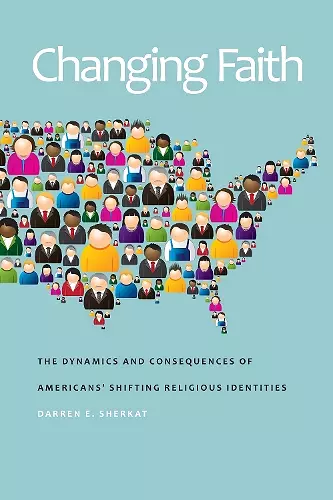Changing Faith
The Dynamics and Consequences of Americans’ Shifting Religious Identities
Format:Paperback
Publisher:New York University Press
Published:22nd Aug '14
Currently unavailable, and unfortunately no date known when it will be back

More than anywhere else in the Western world, religious attachments in America are quite flexible, with over 40 percent of U.S. citizens shifting their religious identification at least once in their lives. In Changing Faith, Darren E. Sherkat draws on empirical data from large-scale national studies to provide a comprehensive portrait of religious change and its consequences in the United States.
With analysis spanning across generations and ethnic groups, the volume traces the evolution of the experience of Protestantism and Catholicism in the United States, the dramatic growth of Hinduism, Buddhism, and Islam, and the rise of non-identification, now the second most common religious affiliation in the country. Drawing on that wealth of data, it details the impact of religious commitments on broad arenas of American social life, including family and sexuality, economic well-being, political commitments, and social values.
Exploring religious change among those of European heritage as well as of Eastern and Western European immigrants, African Americans, Asians, Latin Americans, and Native Americans, Changing Faith not only provides a comprehensive and ethnically inclusive demographic overview of the juncture between religion and ethnicity within both the private and public sphere, but also brings empirical analysis back to the sociology of religion.
Provides a fascinating glimpse into the changing religious landscape in the U.S., telling us who the winners and losers have been in a half century of demographic and religious change. Using the best available data, Sherkat busts the myths concerning the rise in conservative Christianity, showing that non-Christians groups and unaffiliated nonbelievers have grown faster. Rather than supporting the notion that religions operate like a marketplace, Sherkat reminds us how important ethnic ties, immigrant origins, and fertility differentials are in contemporary religious affiliation. He makes a significant contribution by showing not just how religious affiliations have changed , but why it matters in how people form families and decide upon schooling and careers. If you want to know which denominations are growing or declining and, most importantly, why, this book is for you. -- Jennifer Glass,Barbara Bush Regents Professor of Liberal Arts, University of Texas - Austin
Religious identification matters in the United States, shaping private and publicly-oriented behaviors. This book identifies immigration and generational change as major sources of change in religious identification, and shows why 'grand theories' do not help us to understand the religious landscape. . . . An important book which will serve as a resource for scholars and students who want an accurate, empirically-based understanding of the causes and implications of Americans' changing religious identifications. -- Penny Edgell,author of Religion and Family in a Changing Society
Changing Faithis a well-written, compelling book. By illustrating the importance of demographic factors in understanding religions in the United States today,Changing Faithis an important book with which all sociologists of religion should be familiar * Sociology of Religion *
Darren SherkatsChanging Faithis an interesting and valuablebook. []Changing Faithis worth reading, debating, and teaching. * American Journal of Sociology *
a work that is highly relevant and useful for further research and application. This book is highly recommended * Catholic Library World *
Sherkat's study undermines the popular claim that while fewer Americans have a formal religious identification, they nevertheless retain many of the trappings of religious belief and personal practice. * Choice *
The great virtue of this book is that it compiles in a single place almost everything worth knowing about American religion that can be learned from the cumulative U.S. General Social Surveys (GSS), surveys that have been collected every one or two years since 1972. . . . This is a great book. The style is clear, the coverage is comprehensive, and the analysis is insightful and sophisticated. * Journal for the Scientific Study of Religion *
ISBN: 9780814741276
Dimensions: unknown
Weight: 340g
240 pages